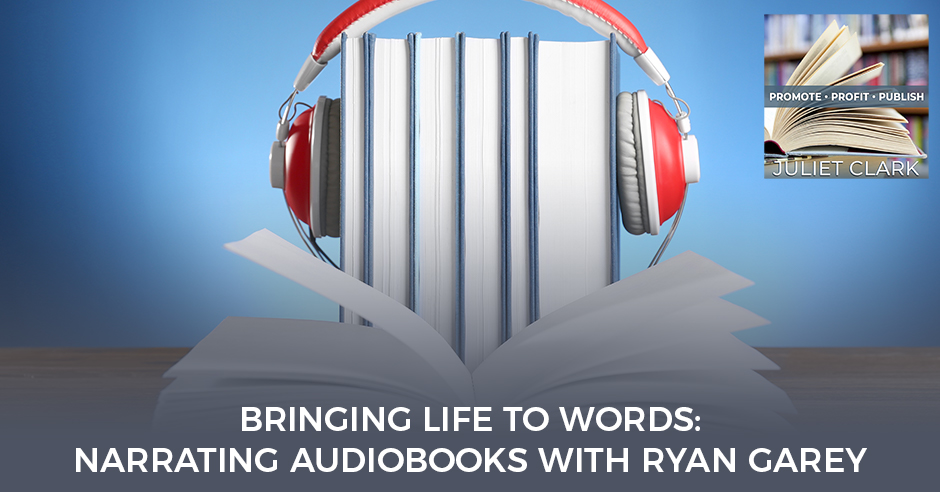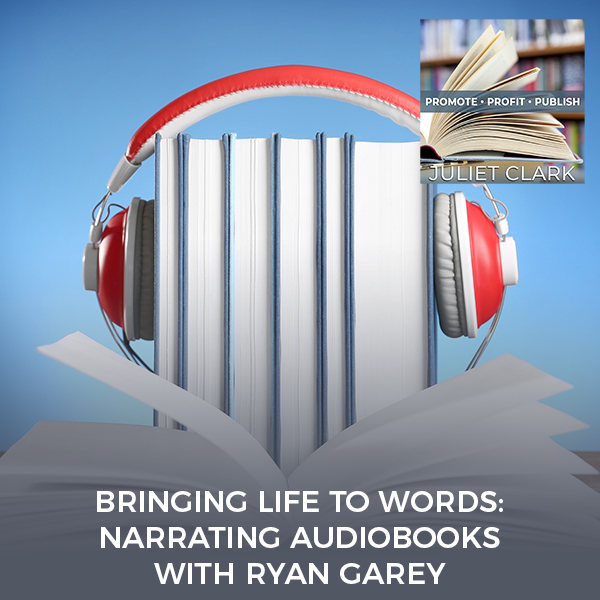
Why do audiobooks? How do audiobooks help in getting the message across to the book’s intended audience? Ryan Garey—a professional narrator, motivational speaker, certified coach and mastermind facilitator who helps authors get more reach for their creative work through audiobooks—answers these questions and more as he joins Juliet Clark in the podcast. Listen to Ryan as he talks about the booming audiobook industry and why it makes sense to always partner your book with an audiobook. Ryan believes in the power of neurolinguistic programming and neurophonetics and the ability of audiobooks to give the audience a unique experience that is just not possible with any other medium.
—
Watch the episode here
Listen to the podcast here
Bringing Life To Words: Narrating Audiobooks With Ryan Garey
I have a different guest. One that we haven’t had in all of our episodes. We’ve never invited an audiobook specialist so that’s exciting. Ryan Garey is here and he has narrated dozens of full-length books, commercials, and training programs, and helped edit and coach others on producing their own, too. It makes him truly uniquely well-rounded and in a great place to help anybody at any stage of the game looking to expand their reach and their message and get yourself heard. Ryan, welcome. We’re going to talk about a couple of different things besides audiobooks, too, right?
Yeah, it all comes back to audio in some way, shape, or form. How is our message impacting lives at the end of the day?
As soon as I connected with you, I knew that you had something special to share, not only the voice because I don’t think that people understand with the audiobooks when they record their own, it’s not just, do they have a great voice? I tried to do my own once and I found that I have no breath. Tell us a little bit about what these voiceover specialists go through to get where they’re at? Why aren’t the rest of us able to do that?
There is a difference between talking to a normal person having a conversational dialect. If I were to talk to you the way I narrate an audiobook, it would be a little ridiculous just like if you were to talk to a normal person the way you talk from stage. Imagine when you’re doing a stage presentation, the way you talk from the stage is inherently different. Imagine someone were to come to you in a commercial narrator’s voice and talk to you in that tone every day, “Juliet, it’s great to meet you. It’s great to be here.” If you had that kind of excitement and inflection, and you’re talking dynamically all day long, people can understand you. When we change the medium of our message, the inflection patterns, and the ability to carry your voice in certain ways completely changes. The medium changes the resonance, power, tonality, and how your voice message is heard.
If your book is your business and story and nobody reads it, you’re not getting the recognition that you truly deserve. Share on XHow did you get into audiobooks?
I stumbled into it in a way. In my early career, I was a college counselor with a fledgling university at the time called the University of Phoenix Online, which was starting this new thing called online education. I was there when there were just a couple of hundred of us in two buildings at the end of a cul-de-sac here in 2000 to 2001. By the time I left that company, we had 13,000 employees, twenty buildings, and we’re the largest educational conglomerate in the history of mankind. During that time, I crafted a way of selling people on gaining experiential education. I earned a letter of recommendation, as a matter of fact, from the CEO of all the Apollo Group for my contribution to this because my point was, “Quit selling the concept of an online degree. What we’re selling is the ability to become adult experiential learners.”
What that means is employers don’t care what you know. They care what you can do. I was coaching and consulting my clients, those I was counseling in college on finding ways that you can do to leverage, instead of trying to figure out what it is that you want to do in your life, which can be difficult. Especially when you’re talking about spending $50,000, $60,000, $75,000 or $100,000 on it. Be experiential and experimental in life and find out what it is that you can do well so you can make money and then enjoy that money in the time that you have to enjoy what it is that you love to do. Turn what you love to do into your sole income source. I had talked to hundreds and eventually thousands of people who did what they loved but at some point, it became a job. At some point, it became their had-to. It’s not I love to, it’s I have to. “I have to get up and do this,” and that changes things.
I got into voiceovers because when I quit my job at Infusionsoft back in 2010, I had a wife who’s a full-time mom to our kids, and I had asked myself the question of, “How am I going to pay rent?” I had to apply the same principle that I applied to my students. I said, “What can I do?” Not what do I want to do and what’s best. Let me reverse engineer this. What I realized is that one, I had the ability to write and read a sales script. I could read scripts like nobody’s business because I spent many years refining and developing my script, writing my script, and reading process. One, I knew I could read a script. Two, I was an audio engineer and I loved music. I could do lots of audio engineering and I had thousands of dollars’ worth of audio gear. I understood that. I said, “I know I can do these two things.”
The third component was this. Typically, there are many chains of command that one person in the audiobook business doesn’t make a lot of money. There’s the narrator, engineer, mastering, and publishing. There are a lot of steps involved in producing it usually, so there’s not a ton of money. I thought, “How do I make money with this?” I applied my same sales psychology and I found someone who had a tired old eBook that was good content but it wasn’t getting traction. I not only narrated it but I also did a video of the text. I’m sure you’ve seen these video sales letters. I applied the same psychology to eLearning. With one production of doing the audiobook and the video, he now had both from an eBook into having an audiobook that he put up on Audible. He has a video course and a video course tied into Infusionsoft that could track where someone left off and nurture them along and put them going.
From one eBook that he was giving away to having an audiobook he was selling and a coaching course that went along with it for $300, which completely changed the game. Trying to get a high dollar value for an audiobook can be a little difficult at the time, especially that I wasn’t that well-known. It was one of my first, but I had to make good money. I thought, “How do I make money off of this?” The best way was to find someone else to make money. We help you turn your book into a course that you can make money off of. I was able to get $20,000 for building out a course. No one’s going to pay me $20,000 for an audiobook, but I can get $20,000 for building out a course. The audiobook just happened to be the byproduct of that. Does that make sense?

Narrating Audiobooks: The way you use your voice changes the resonance, power, tonality, and how your message is heard.
That makes a lot of sense. You explained my next question, which was, why would someone want to do an audiobook?
The reason why you want to do an audiobook now is a little bit different than it was years ago. The reason why you’d want to do one now is there are a couple of reasons. One is the obvious solution, which is that people are too short on time. Audiobook sales continue to climb, so that’s another reason. We can point to some data. It’s not me saying, “Are we short on time?” and let’s all agree. The truth is audiobook sales are climbing by exponential orders year after year while eBook sales are falling. The value of having an audiobook is not only for the potential to get into markets into things that you can’t. One, you can sell more. Two, with that audio, you can take snippets of that audio and put that onto iTunes, SoundCloud, and into these different channels and mediums that normally you’re not getting onto. You can’t get onto these channels or onto these mediums unless you have audio.
With that same audio, you can put a little picture behind the background and put that same little snippet up on YouTube. Take your book, which only has one way of getting out to people and with audio, even a simple image, you now have a multimedia presentation or content that you can now disseminate to all the networks, corners, and reaches of the internet so you can get found. One big reason for doing an audiobook is that the audio allows you to get found in more ways. Second, once you get found, they will be more likely to listen. They can do it while they’re doing their dishes, they’re jogging, doing their exercise, and doing other things.
The first reason, get more reach and get your exposure out there. The second reason, get them to hear your message. Three, your book and the message you have can do what it was intended to do and have an impact on that person’s life. That is the object of any book. Sadly, a study was done years ago, and I’m sure it’s worse now, but back then, less than 18% of people got past the third chapter of a book. It’s one thing if it’s a fiction book and it’s another if it’s a cookbook. If this book is your business, your story, and how you nurture, qualify, and educate your prospects into becoming better-qualified prospects for you and they don’t read it, you’re not getting the leads, nurture, qualification, and recognition that you truly deserve.
That’s a great point because I don’t think people realize how much people listen to audiobooks. I know myself, I have a subscription in the car and on a trip. I work out almost every morning when I’m at the gym. Most business people, that’s the way they consume their education. I was on a call with someone before and I recommended some books to get the audiobook. If you like it and use it as a guide, get the hard copy or the soft copy of it. A lot of people do that. If they like something, they go back and buy the other version as a reference on it.
I didn’t mention this other reason why, which I hit on. I don’t want to offend anybody here. There is no self-respecting book that goes to market that doesn’t have a companion audiobook. There’s no well-respected book that doesn’t have one. The fourth reason why you should have an audiobook is because you need to have an audiobook. It’s expected. It’s part of the culture of the publishing industry that you have one. That can be a powerful tool to getting all these other things done but one of the big ones is because it’s part of the status quo. When you break that status quo and you break that operation of, “Why don’t you have one?” it almost invites the negative side of curiosity as opposed to the positive side of curiosity.
There is no self-respecting book that goes to market that doesn’t have a companion audiobook. Share on XHere’s the other thing that I love about a lot of the big players out there who are doing the audiobooks. Their lead capture is bringing those people into a workbook or downloadable sheets where you can do your own exercises. Boom, that off funnel. I’m going to call you guys off funnel because if you have a funnel where you have direct contact with your clients like you do through a marketing campaign, you know the analytics. When you’re out on a podcast is a great example, and also Amazon. You know how many people bought your book but you don’t know who bought your book. This is a way to start finding out who is that audience that’s buying it and how I can serve them by connecting with them.
That’s an important, specific tactic to be aware of. When it comes to audiobooks in Audible for example, Audible is the titan, the 300-pound gorilla in the room. Audible is where most people are at. Audible gives you the chance and the choice to have it exclusively on their site and they will give you more commission. Do not fall for it. They own your book. You cannot take your book and you can’t give it away as a bonus for the people who buy your $1,000 coaching program. You can’t take that book and give it away as a free lead generation when you’re in front of an audience of 1,000 people. You can’t do that. Do not choose the exclusivity agreement with Audible. If you go your own route and I’m not helping you in any way, that’s fine but make sure that you do not choose that agreement. They word it carefully. They word it, so that way, you want to go the exclusive route and don’t quite fully comprehend. Some people have shot themselves in the foot. It’s one little checkbox that you click when you upload and you’re done.
To bring that up, it’s the same thing with Amazon. When you go into loading your own Kindle and you participate in the five free days, you’re stuck with them for three months. You cannot publish anyplace else. If you think, “I’m going to do it and get away with it,” I have news for you. They have feeders and they will find where your book is on one of these sites because they have a lower price guarantee that they’ll sell it lower than anyplace else. Way back in 2011, on one of my books, I tried to game it and I’ve already used my five days but I learned a little lesson there, so don’t get caught. Believe it or not, I don’t know if you know this, Ryan, but back then, they also had feeders where they could find out if your reviews were real. They can tell when you faked your reviews and a lot of authors back then were having people from Fiverr. The point is don’t try to game the system with either of them.
You game the system by doing the work ahead of time to have the reviews.
That is platform-building, which is what I do. Ryan, I have a lot of experts in my audience and they’re already doing webinars and on stages speaking. How is that different than being a trained performer and getting in front of that microphone to record all of this?
There are a couple of components to it. One is technology, two is technique. When it comes to technology, it’s having the right kind of microphone and software to be able to get the noise floor low enough so you don’t hear static in the background. Good gear and good microphones change the sound of everything. For example, I have a home studio, a mobile recording studio. I designed my rig that’s about $2,000 that can go head to head with $30,000 rigs. I have friends that cannot believe that I can produce the audio that I produce with this low-cost rig that I have. By design, I spent tens of thousands of dollars split testing which microphone technology works well with my voice, which preamp works well with that microphone with my voice, and which systems and plugins. Those are the signal chains. Technology matters and that technology does need to be paired well with certain voices.

Narrating Audiobooks: Audio gets you more reach, gets people to hear your message, and allows your book to do exactly what it was intended to do and have an impact on a person’s life.
Some people’s voices sound better with some microphones. It’s the way it is. You just have to guess and test. Professional audiobook narrators, when someone’s hearing your voice usually through headphones, they can hear more than through a normal loudspeaker. That’s one of the reasons why audiobooks have to be superb, super crisp. If you’re doing an audio dramatization, you can have little superfluous sounds here and there, but if your voice is the only thing they’re hearing, they’re going to hear every little flub and every little thing. That’s why the technology matters, the way you sounded. I used to hate the sound of my voice. I could not stand it. A big part of my training is doing uncomfortable things.
You know a little bit about my journey and whatnot. A part of my journey out of where I was at was doing things that I wasn’t comfortable with. Selling myself on doing things that I don’t like to do like recording myself and listening to myself. I didn’t like it. Because we’re our own worst critics, I also knew that I could be my best critic. I sucked it up, did the work, and listened. I could outsource to my brain and trust that my brain is picking up on all the things that I did wrong, good, great, and can do better. Instead of re-establishing a relationship between myself and my brain, “I don’t like my voice. I don’t like the way I sound. I don’t like this. I’m like that.” To convey that clearly, I reset the relationship to my brain to say, “This is good. We love what we have. There are some things that aren’t great, but we can make it better.”
That’s starting to get into the technique. The technology matters and I had to find the right microphone at the time to suit my voice. On the technique side of things, there is a certain pitch tone and pace which you have to go. When you’re on stage, you can say little things like that little mouth noise that has no reference or meaning in a webinar. No one’s going to say, “He just clicked his lips.” Because the focus is more intense, small subtleties stand out. The breath matters. Luckily, as a part of my path out of my former life, I played the didgeridoo and it gave me the ability to do this circular breathing where I was working my diaphragmatic muscles. I’m working my muscles and I can control my breath. I can control the movements of my tongue in finer ways.
The technique is ultimately learning what I call neurophonetics. Many people are familiar with neuro-linguistic programming, which is you’re dealing with a group of experts. Many people here have probably heard of neuro-linguistic programming, but it means how our brains and our behavior ends up being programmed by the languaging that we use on a neurological level. Our brains and our bodies respond and are programmed by our languaging. That’s been around for a long time. I am dubbing what I call now neurophonetics, which is not just what you say, but how you say it that matters. I could say, for example, “I want to be your friend,” or I can say, “Juliet, I want to be your friend.” Intonation delivers the message. The words can deliver a message and when you have a book, those words are open to the interpretation of the reader.
Another reason why you want that audiobook is because you tell the reader, “This is the proper intonation and inflection pattern to give a meaning behind those words.” There are the words and then there’s the meaning behind the words. That’s what neurophonetics delivers. It’s the slight languaging patterns. Another example that many people do on a daily basis is, “Why did I do that?” The hard sibilance on the T gives a definitive to my brain that says, “I’m not going anywhere until I get an answer.” If I say, “Why did I do that?” even the way I say that does not say that I’m open to an answer or looking for an answer. The other one says, “Why did I do that?” It says I’m open to an answer but when I say, “Why did I do that?” I can put extra emphasis on that T. It’s definitive and concrete.
“I’m not going anywhere. Brain, you give me an answer on why I did that because that matters to me. I did something that I didn’t want to do so that caused a lot of pain. I’m not going anywhere until I have an answer to why I did that because I’m not going to do that again. I’m going to study myself. I’m going to be a student myself.” That’s what I say on the technique side of things, it’s a life journey. It’s not just reading an audiobook. It’s understanding how we speak affects ourselves and the people around us. Studying that is how I got into audiobooks. Understanding those languaging patterns inside myself. Not just the words I was using, but how I was using the words. Sometimes we have the right words, we’re just saying it the wrong way. Using that to help myself and pull my personal life out of the gutter and develop myself as a professional. Over time, it led to this path to where I can do audiobooks in a unique way.
I have one of the consistent compliments I get. I get people saying, “I normally have a hard time listening to audiobooks so I have to look past the narrator’s voice, but I like listening to your voice. Your voice relaxes me and puts me at ease.” Some of the constant compliments that I get are that they like listening to my voice as I speak and that’s by design. I have specific neurophonetic patterns that are designed to set the nervous system at ease and let the reader know, “You’re safe. It’s okay.” When someone’s stressed out, we not only get tunnel vision, but we get tunnel hearing. We can’t hear words and we can’t hear the deeper meanings if we’re stressed out.
As an audiobook narrator, why me? Why choose a certain narrative over another? What do you need to do to change your voice in order for you to have an audiobook versus a webinar versus the stage presentation versus this? Your audiobook has to have an element of peace to it. That way, they can have sustained listening. They will keep listening. They won’t just listen for 5 or 10 minutes and go, “Cool concept,” and move on. They will stay listening and they will keep listening. They’ll listen again because it makes them feel good.
An audiobook has to have an element of peace to keep its audience listening. Share on XFrom an entertainment point of view, you were saying how people can’t get through much of an audiobook. I have a great example. There’s a fiction author I love. She decided to read one of the characters in her book and had a lisp. It completely ruined the entire book for me. I was like, “Whoa.” It was a British accent with a lisp, to boot. You have to be careful. I know I sent you over tape one of my people that recorded their own book and you’ve got to take a look at it and evaluate it. That particular person is someone who you have to have him read his own book because there is personality and a big presence behind him. What about those people who don’t want to read their own book? How do they connect, what should they do, and how do they solve that problem?
I’d like to address the people who do want to read their own book in situations where that’s appropriate. Just because you do your own book, doesn’t mean that you can’t have someone else do your book too. You can provide options. You can say, “Here’s the edition narrated by the author themselves.” In some people, that’s going to be endearing. They’re going to want that. You can have another version narrated, for example, in this case, the author is a male, so you might want to have a professional female narrator read it to provide the difference in hearing patterns for whatever reason. You get that I’m a businessman as well as a marketer. Some people respond better to male voices than female voices inherently. Our brains hear things differently from different voices. Just because you do your own book, doesn’t mean you can’t have someone else do it too. You can provide two different additions to it to speak to it in different ways.
The second thing is you can have someone else do your book for you first and you can even have someone do it for you in a non-professional way. If you have someone who you know can narrate your book and they don’t need to do it in a professional way, but you want someone to help with the inflection patterns, I’ve done that for people before too. I’ve read their book and sections of their book into a voicemail little into my cell phone. That way, they could hear the inflection patterns like, “That’s how I would say that one.” That can help coach them. That’s what I do when I’m coaching someone through doing their own. It’s a combination of, “What tools do you have?” “What microphone do you have? Let’s dial that in.” The other side of it is the technique, so I can help coach on that as well.
For somebody who wants it done, they want white-glove treatment and they want to have that done, as you know, I don’t have a website up saying, “Ryan Garey does audiobooks. Come sign up here. Here are my package prices.” I’m a full-time entrepreneur, which means I’m working from home full-time with my wonderful wife and three kids. It means that I’ve worked hard to have a life where I get to do the things that I love and they do bring me money, but I’m not dependent on anyone having to make me money. That way, I can stay flexible and stay independent. I, myself, will work with the right book, right author, and right time because I want that joy and love of the material to come out in my voice. I don’t want to act that out.

Narrating Audiobooks: When you have a book, those words are open to the interpretation of the reader. When you have an audiobook, the intonation and inflection patterns of the narrating voice give meaning behind those words.
If I’m going to read someone’s book, I want to feel the joy and love, all of that material to come out through my voice naturally, automatically, and elegantly. I do have friends and other people who narrate so I can point them to some good directions of someone who might be better for them and I might even be able to tell them if you don’t want to do your own book and you want someone else to do it, I’m going to challenge you to still do your own book. If you’re doing your own book, you might want to have someone else do it too. If your heart is set on saying, “I want someone else to do my own book. I want someone to do my book for me. I want white-glove treatment and I want that done,” that’s fine. If you have more money than time, we can find someone to get it done for you like that professionally, cleanly edited, all the neurophonetic programming built-in, and baked in. We can take care of that for you.
I’m also going to challenge you. If you have some time and you care about the quality of your voice and your ability to present not only in audiobooks but onstage, on webinars, live, and all of that, then connect with me as well. We can look at a way of doing some light coaching and some light work and get you involved in the creative process. Eventually, maybe you will have an edition where, “This is me,” versus, “Here’s the professional one that’s up on Audible.” You can even run a special saying, “Buy the book on Audible and you’ll get the one that I narrated for free as well.”
This has been illuminating. Thank you. Where can people find you if they want to reach out and talk to you more about possibly narrating their own book or getting those referrals to other people?
You can find out a little bit more about me at RyanGarey.com. It’s a static site. It tells a little bit more about me and my background. You will find that much about me on social media but feel free to connect with me there. I’ve been blessed and fortunate enough that I haven’t had to live on social media or had to market myself in that way. I’ve got lots of friends, connections, and people who love me and love my work and all the different facets that I work. I’ve been blessed that way. If I’m a little slow to respond on social media, that’s fine, but check with me there. I’ll give you my email address as well. That’s the best way to get in touch with me to shoot me an email and that’s Ryan@Collaborating.com. It’s all about collaborating. Even your audiobook is a collaboration between the content, words, author, here, and ultimately, how those words are impacting that here in a real way to change their life. It’s going to tell us where I like to live.
Thank you for being on. We appreciate it. The information is great.
You can tell I love what I do so don’t hesitate to shoot me a quick email and let me know about what your project is. Either I or my assistant will reply back with a link to get on my calendar and I’ll see what’s there. If I can’t help you, it doesn’t make absolute sense. I can at least point you in the right direction and give you some good pointers on what kind of microphone for your voice you might want to have. I have a good ear for that based on your budget. Those are all some of the things that I can help point you in the right direction on and I’m not going to charge for that at all. I appreciate the relationship with you, Juliet. I appreciate you. This is something that I’m doing for you and your audience.
Thank you. I know they appreciate it.
Thanks again.
Important Links
About Ryan Garey
 Ryan Garey is a professional narrator, motivational speaker, certified coach, mastermind facilitator, and creative strategist for projects that do real good in the world. His story and how he -literally- used his voice to move out of addiction, homelessness and hopelessness and into a dream life, is truly inspiring!
Ryan Garey is a professional narrator, motivational speaker, certified coach, mastermind facilitator, and creative strategist for projects that do real good in the world. His story and how he -literally- used his voice to move out of addiction, homelessness and hopelessness and into a dream life, is truly inspiring!
Now working from home for 10 years, being a near full-time father to his 3 children alongside his wife of 17 years, Ryan loves what he calls “the true art of being your boss” and helping others do more of what they love. Once you hear him, you’ll see just how easily he switches from big-picture ideas to actionable insights and motivating follow-through. The way he talks and his raw enthusiasm for life, the creative process, and as he says “thinking in systems” is truly infectious!
Love the show? Subscribe, rate, review, and share!









Leave A Comment